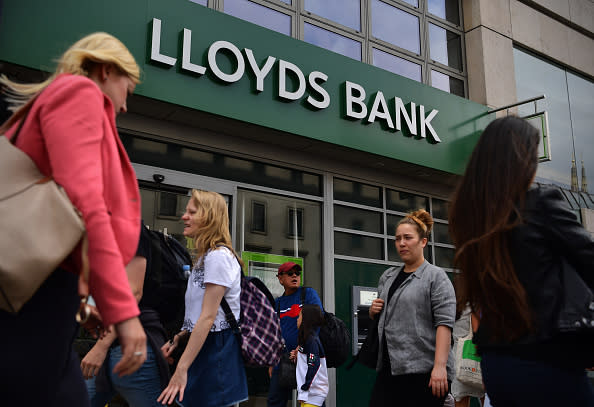Patchy UK economic growth…but at least the banks are getting stronger

‘
Growth is never by mere chance; it is the result of forces working together’ – James Cash Penney
Friday’s UK economic growth number for the first quarter of 2017 was hardly rampant at 0.3% and even though the Office for National Statistics and other august bodies like the International Monetary Fund (IMF) anticipate the UK economy will grow at around 2% for the full year, there’s obviously a few challenges out there.
For example the comment on the service sector was pretty striking with “falls in several important consumer-focused industries, such as retail sales and accommodation”.
Well take away shopping and rampant property prices and maybe dinner party conversation is going to have to centre on something like the upcoming General Election…

So growth is patchy but we have already discussed that after March’s UK budget where I concluded to make the Chancellor’s numbers and assumptions work a soft Brexit had to be sold to the electorate…just what the aforementioned General Election and highly likely thumping Conservative Party parliamentary majority will result in.
READ MORE: The really big message from the UK Budget (that people are not talking about)
READ MORE: French Presidential election round 1: France votes for something different….but not too different
So if the services sector is hardly setting the UK economy alight at the moment, what about the financial sector?
In the last few days Lloyds, Barclays and Royal Bank of Scotland – among others – have puckered up their latest results for appraisal…and I have to say they look ok.
Lloyds is the ‘widows and orphans’ share among the three especially with the UK government primed to exit the shareholder register in the very near future (as at the time of writing the government’s shareholding was just below 0.9%).
Admittedly they reinstated some PPI provisions but the better news was that the rest of the bank moved forward apace with sensible comments about cost control, cash generation and a workable environment.
For Lloyds Bank shares to behave themselves and fund the uplifting of the dividend over the next few years the management team are talking about, the key is for the average UK mortgage holder to keep making their monthly payments.
Today I would rank this as likely even with the aforementioned patchy economic growth levels. If you fancy a bit of regular/growing income from a significant UK company, Lloyds shares are no disaster to look at.
If you want more capital growth excitement then cast your eyes towards Barclays and Royal Bank of Scotland.
I know Barclays predominant corporate colour is blue but it was red faces all around a couple of weeks ago when the current CEO admitted instigating a whistleblower witch hunt for which he was rightly criticised and has probably lots a decent proportion of his bonus.
Aside from dodging a few well-aimed questions on this front, Barclays shares sagged after the earnings announcement hurt by a write-down on their African business (which they are exiting from) and relatively modest overall uplift in their asset value.
Dig a bit deeper though and despite the red faces and issues, progress at focusing the bank on its consumer, credit card, business lending and investment banking arms continues apace.
With the bad bank – stuffed full of the bits of their lending book – they don’t want any more close to being formally wound down due to successfully cutting its size, the underlying Barclays is actually not too bad. Fancy a bit of share capital growth? In my view say hello to Barclays.
Which leaves us with the ultimate UK banking sector bad boy…Royal Bank of Scotland (RBS) in which the company is currently still stuffed with a majority shareholding and no easy, quick or profitable ways to exit.
That they should exit and let the company move away finally from the last hugely negative ten years is pretty clear to me. Anyhow despite continuing lurid headlines about litigation and continuing challenging issues whisper it quietly but progress is being made.
No doubt there will be some special one-off cost to deal with as this year evolves but at least in their first quarter numbers there were some profits.
It still remains a scant return for taxpayers who bailed this name out but keeping their 2017 targets and generating some cash to help improve/strengthen their balance sheet is a start.
The shares initial reaction was to like this too and now at a new share price high when looking at the last year, a little bit of faith is building.
Buying RBS shares whilst the government is selling them sounds counter-intuitive but it is not as crazy as it sounds.
In short, the UK economy may not be growing that much at the moment but that does not mean there are not opportunities and the UK banks are on the recovery track…and in my view offer something different for the income seeker, the capital growth investor and the punter.
And you certainly can’t say that for many sectors of the UK market at the moment.
Chris Bailey has over 20 years of investment industry experience at long-only and long-short institutions as a global multi-asset fund manager, strategist/macro thinker and, in the earlier part of his career, as a securities and fund analyst.
In 2013 he founded Financial Orbit focusing on daily macroeconomic comment and securities analysis. In December 2016 his Twitter account (@financial_orbit) was named as one of the ’50 accounts investors should follow in 2017’.
The content on this page does not constitute financial advice and is provided for general information purposes only. Nothing on this page should be regarded as an offer to conduct investment business or to buy/sell any investment

 Yahoo Finance
Yahoo Finance 
